On October 26, Komil Allamjonov, former head of the Information Policy Department of the Presidential Administration, survived an assassination attempt when his car was shot at. To date, seven suspects have been detained in connection with the crime, including two apprehended abroad. The Prosecutor General's Office is actively investigating the assassination attempt.
Despite several high-profile cases involving the suicides of officials in Uzbekistan in recent years, these incidents have received little public attention due to limited press coverage. This article revisits notable assassination attempts and deaths, including those of the People's Poet of Uzbekistan Erkin Vohidov, Vice President Shukrullo Mirsaidov, the first President Islam Karimov, and three regional governors.
"The main goal was to intimidate."
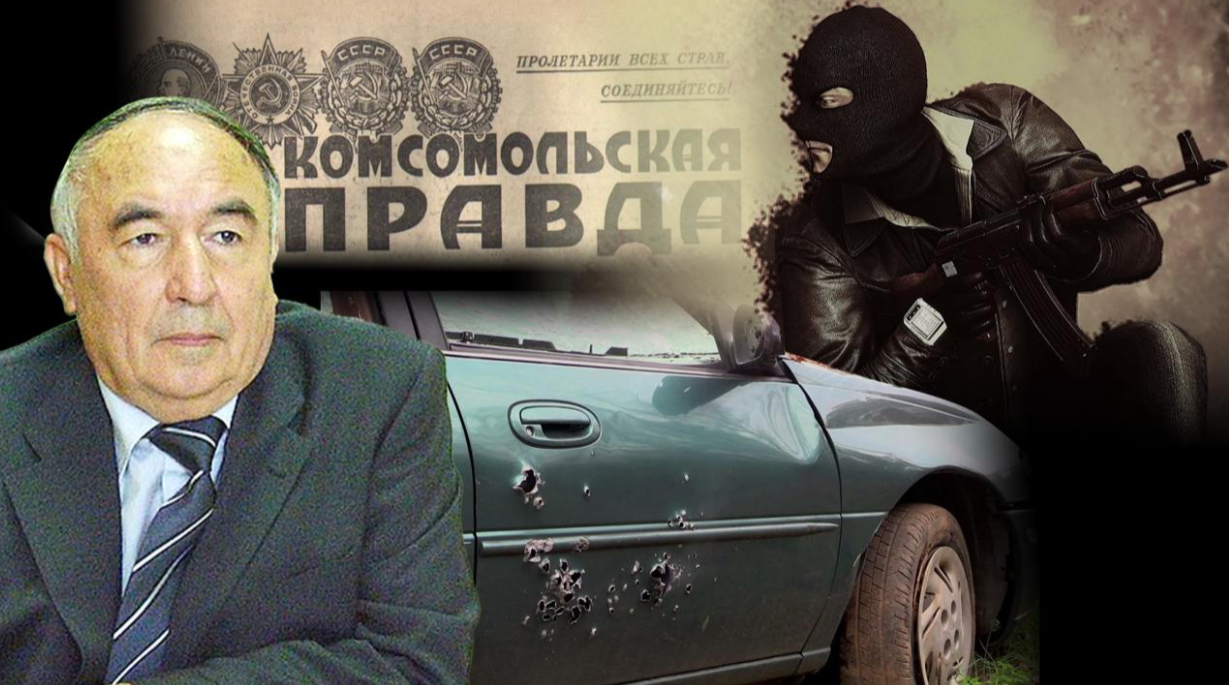
In July 1991, at the intersection of Amir Temur Avenue near the Uzbekiston Hotel, the car of Erkin Vohidov, the People's Poet of Uzbekistan, was shot at multiple times. At the time, Vohidov was a deputy in the Supreme Council and chaired the parliamentary Committee on Transparency. The attack happened after several deputies nominated Vohidov for the chairmanship of the Supreme Council.
The incident was initially reported in a July 27, 1991, article in Komsomolskaya Pravda, while other publications remained silent despite its significance.
The Russian-language report stated that Erkin Vohidov's car was struck twice by sniper rifle bullets, a detail confirmed by the forensic report. “The bullets hit the roof of the Volga,” the article noted.
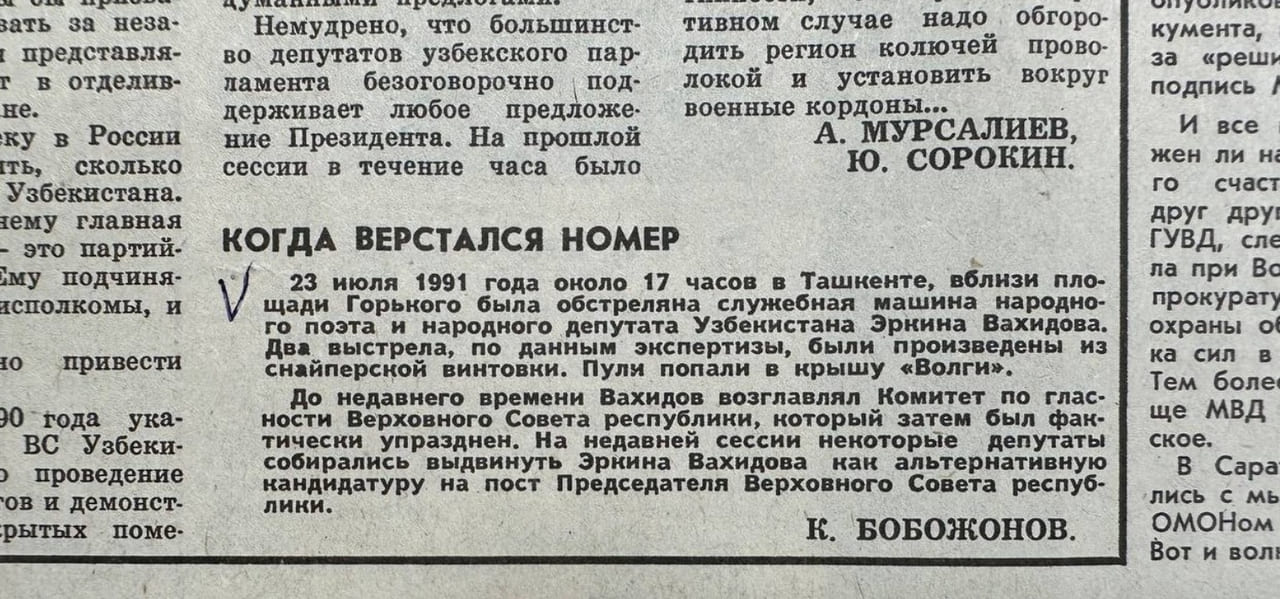
Interestingly, from July 30 to August 2, 1991, several major newspapers, including Xalq so'zi, Tashkent okshomi, Sovet U'zbekiston, Tashkent haqiqati, Yosh leninchi, Qishloq haqiqati, Uzbekiston adabiyoti va san'ati, Pravda vostoka, and Vecherniy Tashkent, published denials of the assassination attempt on People's Deputy of the Uzbek SSR Erkin Vohidov.
"A thorough investigation by the relevant authorities revealed that this claim was entirely baseless and appeared to be politically motivated.
Experts concluded that the damage to the car—a crushed spot and a triangular hole in the roof—was not caused by a firearm. Instead, it was attributed to an object that penetrated only a few millimeters without damaging the interior lining of the cabin. Furthermore, no foreign objects were found between the lining and the roof.
As a result, it was officially determined that no shots had been fired at the car carrying Erkin Vohidov," stated a report published in central media.
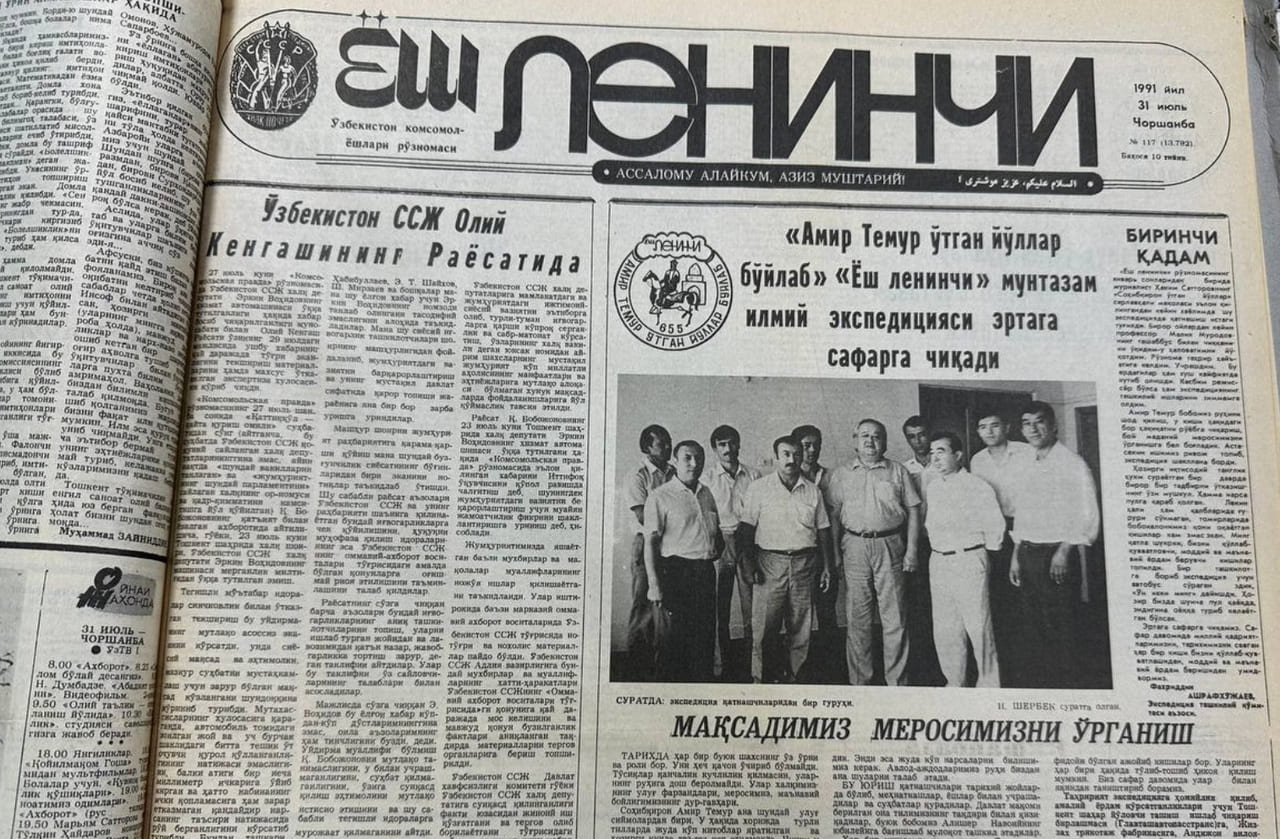
At a Presidium meeting of the Supreme Council on July 29, 1991, the Komsomolskaya Pravda article was discussed, along with investigation findings and the conclusions of a special expert examination. During the meeting, Erkin Vohidov addressed the situation, acknowledging the article had caused concern among his friends and family. However, he denied claims of an assassination attempt.
The newspaper Komsomolskaya Pravda published an article titled "Flying Nails" ("Letayushiye gvozdi"), which quoted eyewitnesses who claimed that nails had pierced the window of a car driving through the city center.
However, those who knew the poet well and heard the details of the incident from his witnesses emphasized that Vohidov's official car was indeed shot at, though neither he nor the driver were injured. The People's Poet, in a state of severe shock from the attempt on his life, was taken directly to the hospital from the scene.
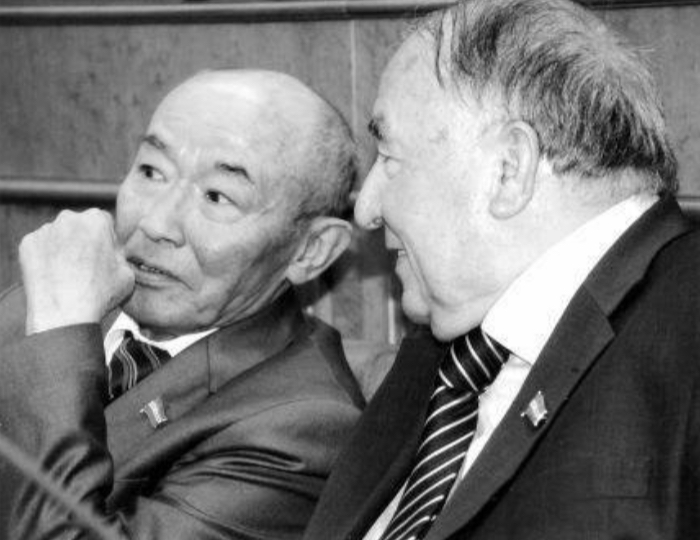
Sources who spoke with Daryo and heard the account from Vohidov himself explained his denial of the assassination attempt at the Presidium of the Supreme Council as an instinctive reaction of fear. According to them, the purpose of the attack was not to kill the prominent deputy but to intimidate him. "The perpetrators achieved their goal, and after that, Erkin aka became much more cautious," said our sources.
Erkin Vohidov, the Hero of Uzbekistan and a prominent figure in the nation's cultural history, passed away on May 30, 2016, at the age of 79 after a prolonged illness. He was laid to rest at the "Chigatoy" cemetery in the capital.
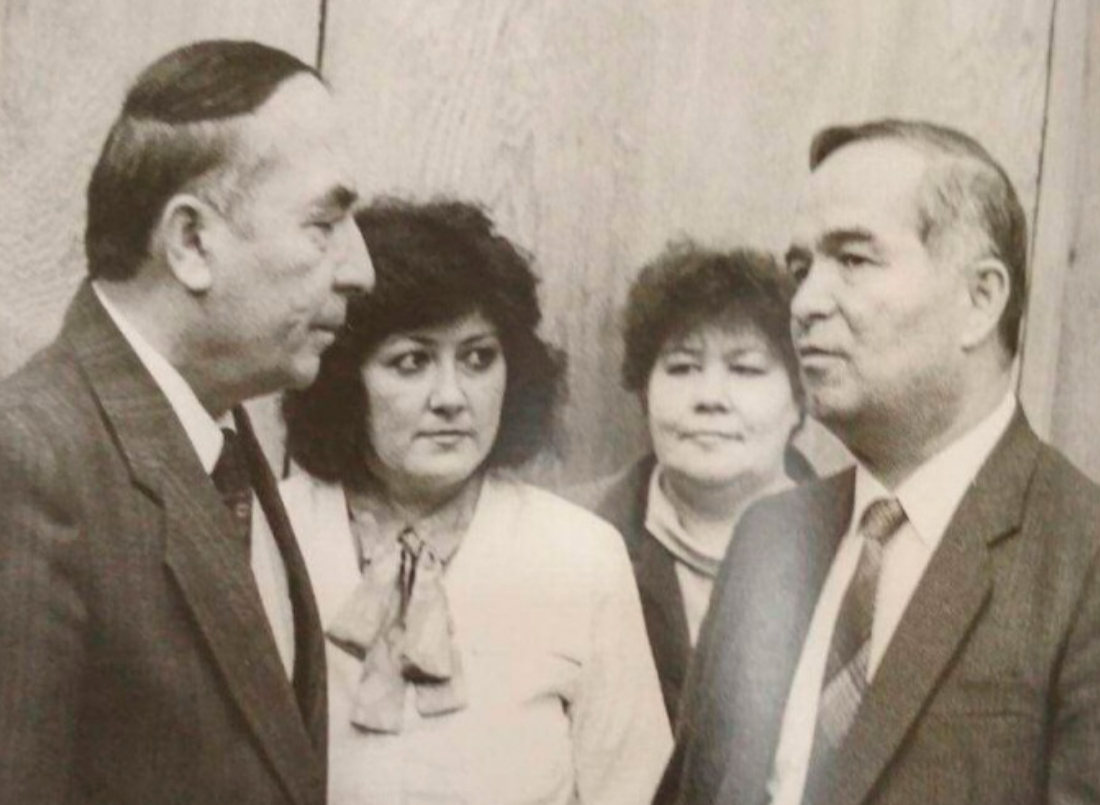
Though political circumstances forced him into seclusion, and central publications remained silent about his passing, efforts have since been made to honor his memory and explore his rich creative legacy.
In recognition of Vohidov's contributions, President Shavkat Mirziyoyev signed a resolution on December 7, 2016, to celebrate the poet's 80th anniversary. A memorial plaque was installed at the house where he lived, and a museum dedicated to his work was established in Margilan, alongside a statue in his honor. Additionally, an Erkin Vohidov creative school was founded in the city.
Official who resigned from the vice presidency
On March 24, 1990, the position of Vice President was established in the Uzbek SSR, with Shukrullo Mirsaidov appointed as the first and only individual to hold this role. However, on January 13, 1992, the position was abolished, and the position of Prime Minister was introduced.
Some sources suggest that Mirsaidov resigned earlier, on January 4, 1992, during a parliamentary session, declaring, "It is better to die standing than to live kneeling."

In 1993, the Supreme Court of Uzbekistan convicted Mirsaidov of abuse of office. The court found that, as Vice President, he had "suspicious relations with a foreign citizen, a representative of a foreign company," and had instructed his subordinates to sign contracts for the supply of cotton that were detrimental to the country's economy.
The economic damage to the state due to Shukrullo Mirsaidov's actions was estimated at $5.6mn. He was sentenced to three years in prison with the confiscation of his property. However, he was released as part of an amnesty announced on the first anniversary of Uzbekistan's independence.
The BBC Uzbek Service offers a different account of Mirsaidov's trial. According to their report, Mirsaidov resigned following the violent suppression of protests at the Student Campus in Tashkent in January 1992. He explained his decision by stating that "democratic reforms are not being implemented in Uzbekistan" and sent an open letter to President Islam Karimov, emphasizing that "authoritarianism is replacing democracy and transparency."
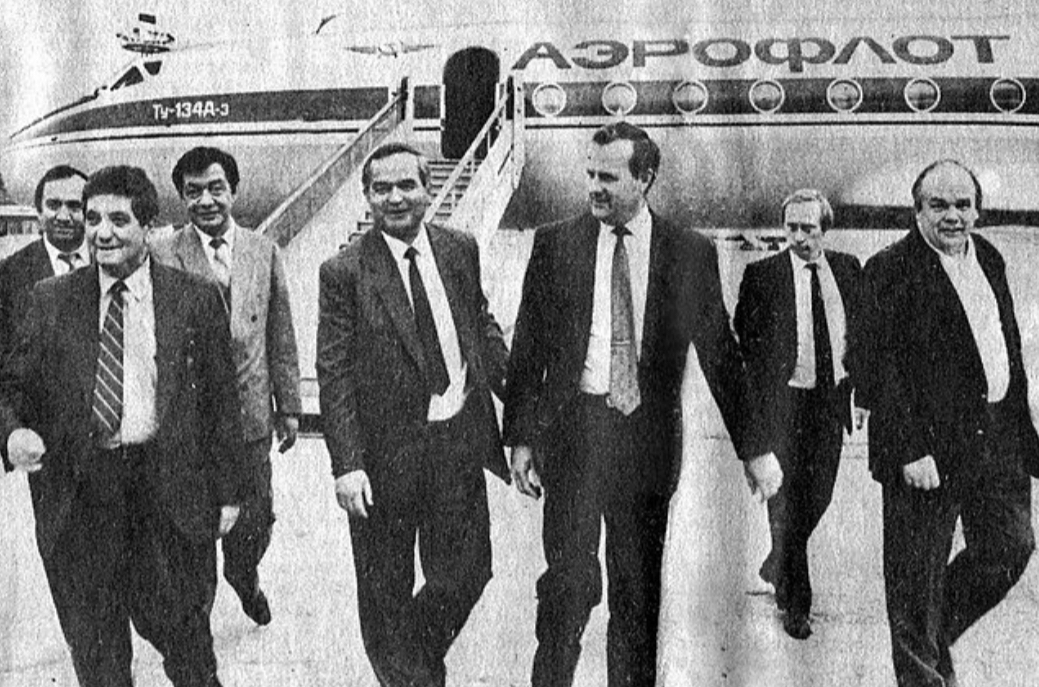
Mirsaidov, a participant in the opposition's "Forum of Democratic Forces" in Tashkent, is said to have tried to unite the movement against President Karimov's government. A fierce critic of Karimov’s administration, Mirsaidov was once viewed by the government as a significant political threat.
In 1992, a major criminal case was initiated against Shukrullo Mirsaidov, accusing him of "extortion and bribery." He was charged with embezzling significant sums of money from Uzbekistan's cotton industry during his tenure as vice president and was fined $1mn. However, an international arbitration court later acquitted him, according to the BBC Uzbek Service.
In August 1993, Mirsaidov survived an assassination attempt when his car was blown up. Despite this attack, he did not abandon his political career. In 1995, his son was kidnapped and beaten by unknown assailants. Following this, Mirsaidov announced his withdrawal from politics and refrained from participating in public life, refusing to give interviews to the media.
Shukrullo Mirsaidov passed away on November 2, 2012, in Tashkent at the age of 73.
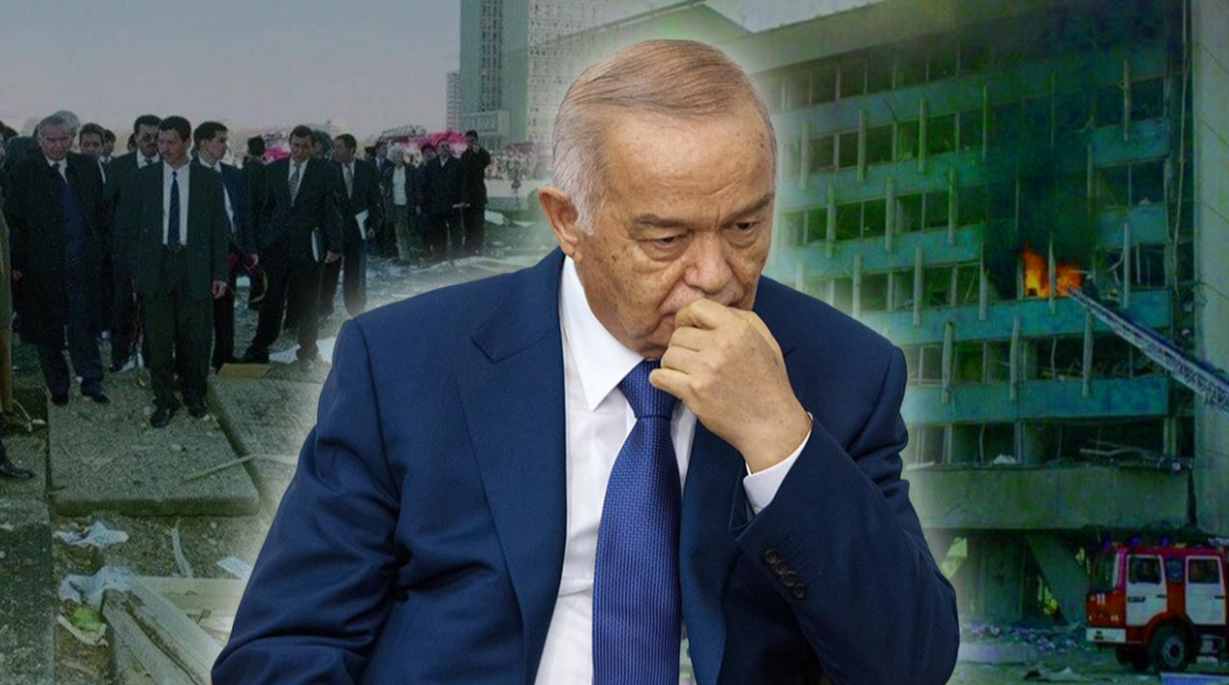
Assassination attempt on Islam Karimov
On February 16, 1999, six explosions occurred near Independence Square, the Ministry of Internal Affairs, the National Bank for Foreign Economic Activity, and the Nodirabegim cinema in Tashkent. Five of these explosions were remotely detonated by cars packed with explosives.
On the same day, a meeting was scheduled at the Cabinet of Ministers building to review the results of 1998, with President Islam Karimov set to attend. Initially described as a terrorist attack, the incident was later reclassified as an assassination attempt on the president. In his book The Dangerous Days Left Behind, the then Minister of Internal Affairs, Zokirjon Almatov, referred to the incident as "an attack on the life of President Islam Karimov."
President Karimov recalled the events, saying, "Usually, I arrive at meetings 10-15 minutes early. But today, I was a little late, and maybe that's why God protected me... A car filled with explosives was parked near the building, and two young men who got out of it and ran away opened fire from machine guns. At that moment, my car was entering the area."
He continued, "Our security guard, Rustam Khodjayev, ran out in front of us, shouted, and directed us off the road, stopping the car and saving my life. If we had continued for another 3-4 seconds, we would have come across the car filled with explosives, and our car would have exploded too."
Despite the unprecedented state of emergency in the country, the government meeting scheduled for February 16, 1999, was not postponed and was instead held on the same day at the Legislative Chamber building.
Official reports state that 13 people were killed and over 100 others were injured in the bombings. In honor of the victims, February 18, 1999, was declared a Day of Mourning.
Following the attacks, significant security measures were introduced in Uzbekistan. Key buildings were secured, the powers of the National Security Service were expanded, and a heightened focus was placed on combating fanaticism and radicalism. Many people were arrested under these charges. As noted by Ishonch publication, these drastic decisions reflected the government's commitment to maintaining national security.
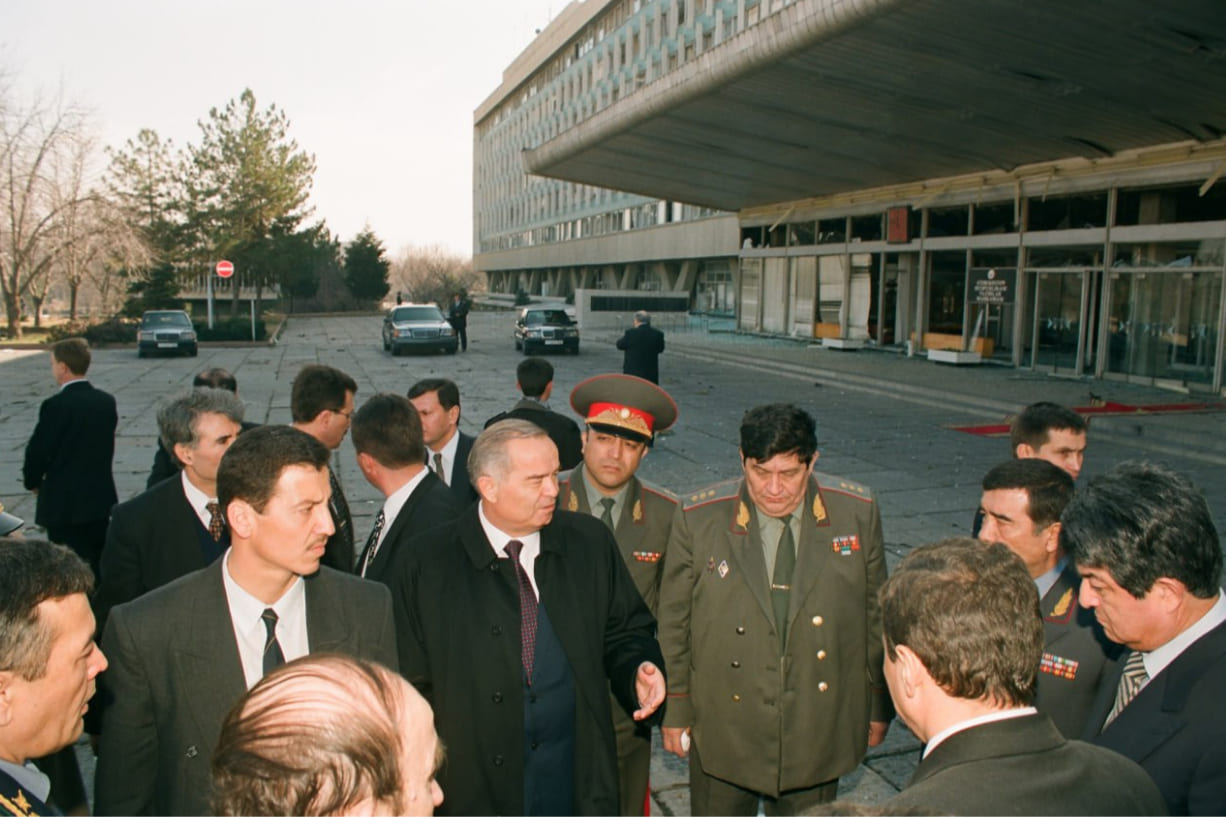
A reward of $240,000, a substantial sum for that time, was offered for information leading to the identification of those responsible for the attacks.
Amnesty International reported that 22 people were tried for their involvement in the bombings. The prosecution of those responsible continued until 2021–2023, with several individuals extradited from abroad and sentenced to lengthy prison terms.
Political scientist Kamoliddin Rabbimov, speaking on the "Lolazor" podcast, suggested that the Uzbek government was aware in advance of the bombings planned for February 16, 1999, but did not take action to prevent them.
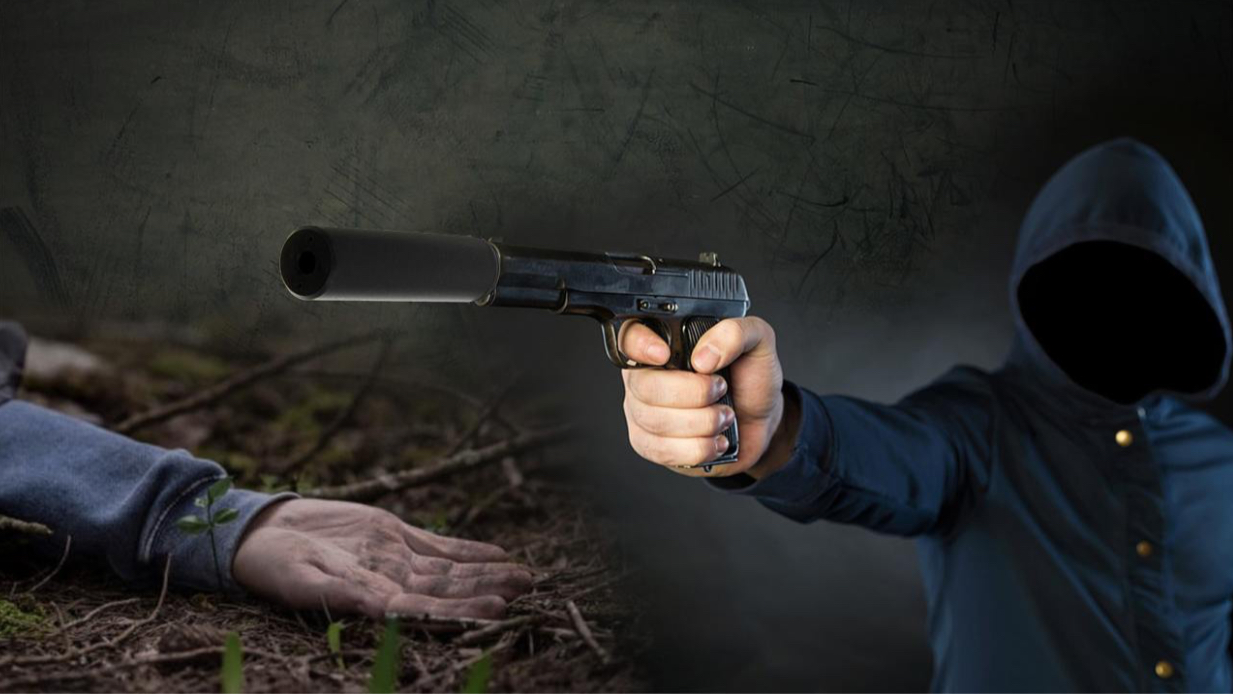
The mayor who was shot while leaving his home
On September 25, 2003, Panji Choriyev, the khokim of Yakkabog district in Kashkadarya region, was fatally shot by unknown assailants near his home.
According to reports, Choriyev was leaving his official residence that morning to supervise the cotton harvest, known locally as "razbor." At the time, a popular television series had many people engrossed, including his wife and children, who reportedly did not follow him. The khokim's official residence was situated in a remote, hilly area near a water supply enterprise, far from the district center.
It was while he was bent over tying his shoelaces in front of the door that Choriyev was shot twice in the neck. The gunman is believed to have used a silencer, as no gunshots were heard. Even Choriyev's driver, who was waiting on the street, only learned of the incident after hearing the voice of the khokim’s wife.
In the aftermath, nearly every male resident of Yakkabog was interrogated, as many were considered suspects in the murder. Multiple investigative groups were sent to the district to resolve the case. After the first group from Tashkent failed to uncover any leads, another team was sent from the valley, followed by a third group that intensified the investigation. Despite these efforts, the murder remains unsolved.
In the investigation of Panji Choriyev's murder, nearly all the men in Yakkabog district were interrogated, with some detained for extended periods and others for shorter ones. Despite these extensive efforts, the identity of the killer has never been definitively uncovered.
One prevalent theory points to an official named M.B., who is said to have had a conflict with Choriyev in the years leading up to the murder. M.B., who served as the head of both the district’s Internal Affairs Department and the regional Traffic Police, and his brother were accused of the crime and subsequently imprisoned. It is believed that M.B. had tried to influence the governor, arguing that the head of the Yakkabog oil depot was his ally and should not be dismissed. However, the governor insisted on handling personnel decisions himself, a matter that reportedly led to tensions between M.B. and Choriyev. As a result, some Yakkabog residents have speculated that M.B. and his brother were behind the murder, particularly since they spent a long time in prison after the incident.
Additionally, another source familiar with the deceased governor, who had held senior positions in the region, revealed that the case was transferred to the Prosecutor General's Office for investigation. "Panzhi Choriyev also headed the Bahoristan district of the region before the murder. After that incident, the case was investigated by the Prosecutor General's Office. But the details remain closed. There is still no definitive answer to the questions of who the killer was and why he killed,” the source said.
Another source suggested that Choriyev's refusal to engage in corrupt practices may have led to his assassination, with local mafia involvement being suspected in the crime.
For context, Panzhi Choriyev, born in 1964, was an accomplished public servant. He graduated from the Tashkent Financial Institute in 1992, earning a degree in economics, and later studied at the Academy of State and Society Building under the President in 1996. Over the course of his career, he held significant roles, including head of the Kashkadarya regional finance department and deputy regional governor responsible for personnel matters. In February 2003, he was appointed governor of Yakkabog district, a position he held for only seven months before his tragic death.
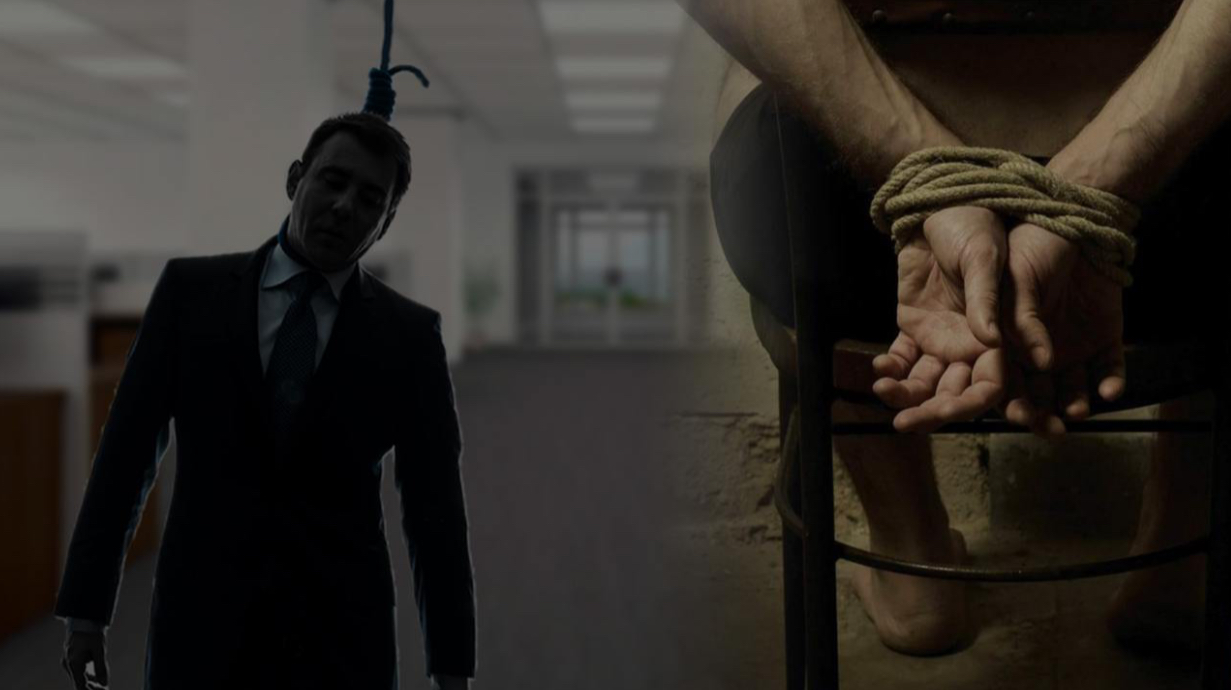
Attempted suicide
On August 13, 2009, Lukmon Gafforov, the khokim of Kitab district in the Kashkadarya region, was found hanged in his office under suspicious circumstances. According to independent sources, rumors confirmed that a criminal case had been opened against Gafforov and his deputies for embezzlement of state property and abuse of office.
"There were also rumors that the district khokim hanged himself in his office before the organizational meeting, which was supposed to decide whether he would remain in office or not," one source said. "He allegedly left a signature."
However, conflicting reports surrounding the cause of his death emerged. "We have heard from reliable sources that he was tortured with cruel methods before his death, that he was electrocuted, and that he died without being able to bear the torture," said a local. "After living in the same district, everyone has acquaintances, friends, and relatives from the same office, and they told us the details of the murder."
According to another version of events, Gafforov had confided in his father before his death, saying, "They are demanding a large amount of money from above," recalls Abdurakhmon Tashanov, a human rights activist who studied the incident.
After his death, "they made a gallows from computer wires to make it look like he committed suicide and hung his body from the ceiling," said a source. "However, whether the hastily made gallows was not strong enough, or the hanging wire could not bear the weight, the ceiling collapsed." When people entered the room the next morning, "they saw the body lying on the floor."
This incident was the second known murder of a high-ranking official in the Kitab district. "During the Soviet era, the secretary of the district committee was slaughtered," said an anonymous source. "That case happened after the 1985s."
Other librarians interviewed by Daryo also emphasized that the story of Gafforov's suicide is highly questionable, pointing to the signs of torture on his body as clear evidence of foul play.
"Initially, there were rumors that he had committed suicide, but it later became clear that it was a murder. The incident caused quite a stir," one interviewee stated. "He was known to be a well-educated, strong leader. It's possible that someone had a personal vendetta against him."
Some sources have suggested that more powerful individuals may have been involved, with claims that a few smaller players were sacrificed to close the case.
"We don’t know for sure who was held accountable for the murder, or whether the case was officially closed as a suicide," another interviewee noted. "This incident was never covered by the press."
According to our sources, Luqmon Gafforov, who hailed from the village of Sariosiyo in Kitab district, was deeply committed to the welfare of the people. Having grown up there, he focused heavily on the district's development and well-being.
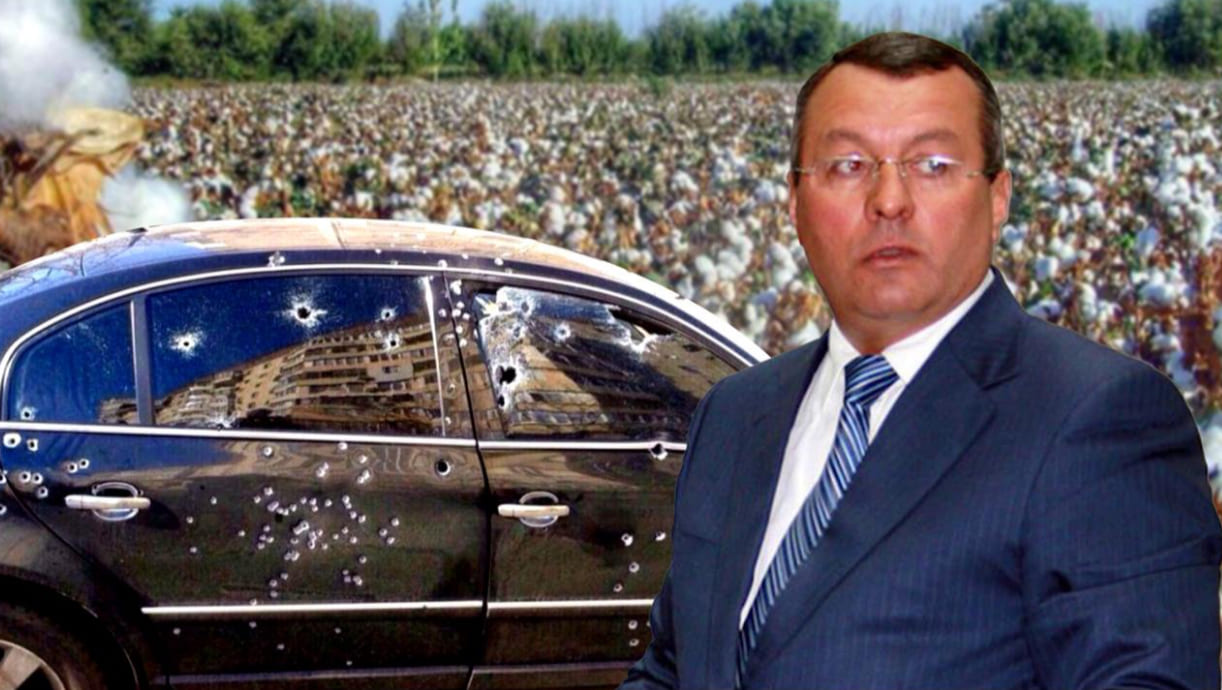
The regional governor whose car was shot at
Do you remember the governor who was found with a million dollars in his safe? Yes, we're talking about Turobjon Jorayev, who was arrested for abuse of office and criminal activities during his tenure as the governor of Samarkand region.
A video aired on Uzbekiston-24 TV revealed that Jorayev orchestrated an extensive bribery network for his personal gain. He fostered localism and embezzled funds driven by his greed. According to reports, the khokim used this bribery system to grant permits for the construction of multi-apartment buildings and allocate land to entrepreneurs for residential development.
The investigation uncovered that Jorayev received $2.1mn in bribes from contractors involved in building 7- and 9-story buildings in Samarkand’s UNESCO-protected area.
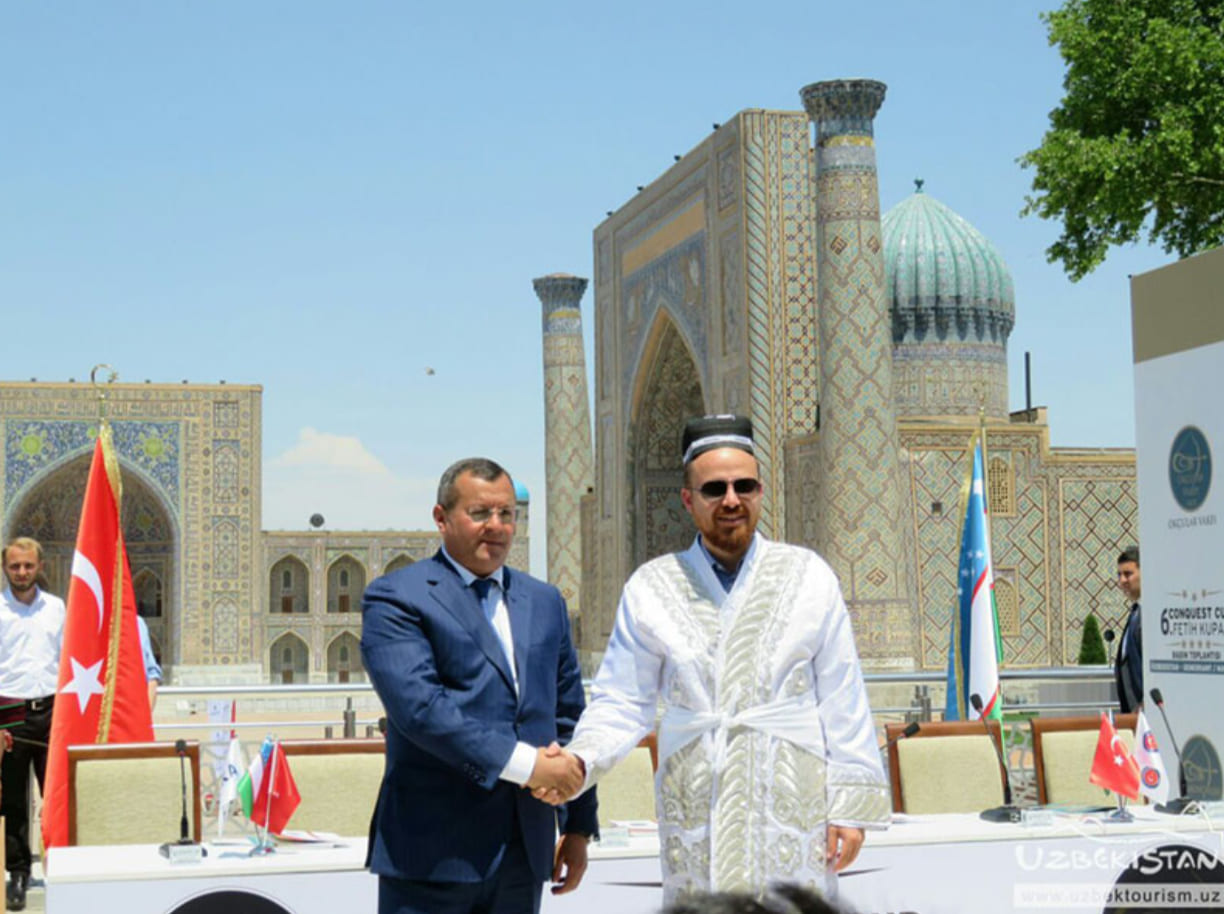
The court sentenced former khokim Turobjon Jorayev to 13 years in prison, with four of his accomplices receiving varying prison terms. It is alleged that during his time as khokim of Surkhandarya and Kashkadarya, Jorayev engaged in abusive practices, calling regional leaders and heads of enterprises to late-night meetings. He reportedly coerced people into participating in cotton-picking, threatening to cut off gas and electricity to businesses that refused to comply and even intimidated them with the threat of closures.
In his time as khokim of Surkhandarya, Jorayev allegedly made a habit of beating and insulting local leaders. In 2011, he physically assaulted eight college directors in Zharkurgan, and in Muzrabot, a 50-year-old farmer committed suicide after facing pressure from Jorayev.
In 2013, while serving as the khokim of Kashkadarya, Jorayev confronted a farmer in Koson district who was planting watermelons instead of cotton. After forcing the farmer to plant cotton, he allegedly beat him severely, ordered his imprisonment, and ordered the police to detain him. Later, reports claimed that residents of Koson shot at Jorayev’s car while he was leaving the district, causing it to overturn and leaving Jorayev seriously injured. However, the incident was never officially acknowledged, and it was said that Jorayev went to Moscow for extended treatment.
Upon his return, Jorayev was personally dismissed by President Islam Karimov, who removed him from his post as governor of Kashkadarya in 2013 due to corruption and bribery accusations. He remained out of the political spotlight until 2017.
In April 2017, Jorayev was reappointed as governor of Bekabad district, and just seven months later, he was promoted to governor of Samarkand region.
If similar incidents have occurred in your area, please write to us via @Daryoga_murojaatbot. We will verify the information you send and, if confirmed, make it public.
Follow Daryo's official Instagram and Twitter pages to keep current on world news.
Comments (0)